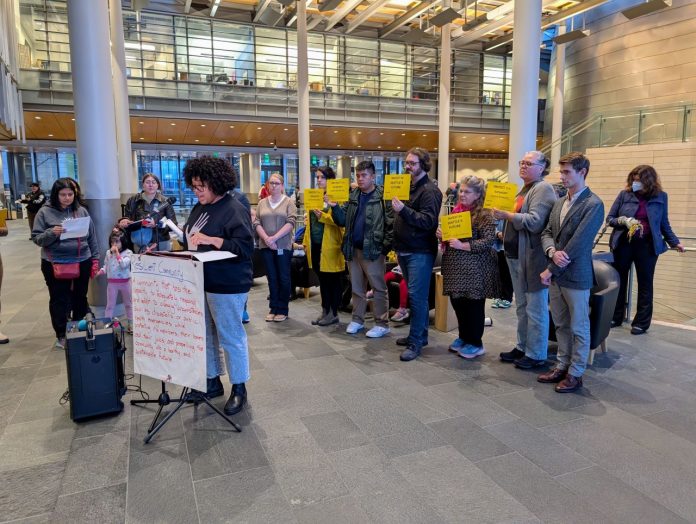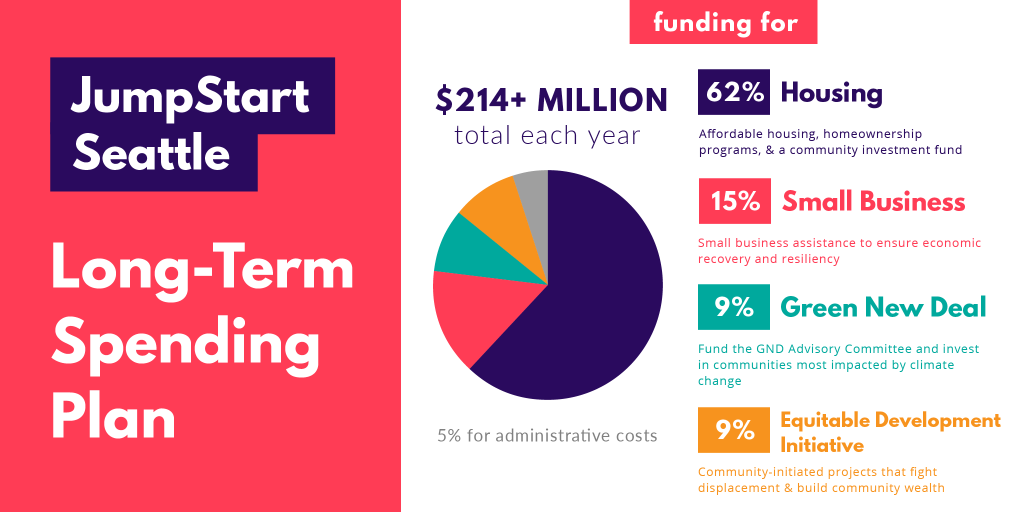
On Tuesday, progressive advocates rallied at Seattle City Hall to make a last-ditch defense of JumpStart housing funds before the Seattle Council finalizes the 2025-2026 city budget next week. Councilmembers are debating budget amendments this week ahead of a final budget committee vote next Tuesday. This Tuesday evening was the last public hearing scheduled on the budget, where they heard from Seattleites asking them not to divert proceeds from the 2020 JumpStart payroll expense tax toward other budget priorities like the Seattle Police Department, downtown activation, and expanded homeless encampment clearing.
At the rally, a group of housing leaders spoke against the budget cuts, sharing the impacts to their respective organizations and communities. Among them was the DESC (Downtown Emergency Service Center), which is one of the largest supportive housing providers in the region. Supportive housing is a type of subsidized affordable housing that includes wrap-around social services intended to help low-income residents exit homelessness and stabilize their lives.
DESC Senior Business Manager Lauren Fay warned of what the cuts would mean for the city’s homelessness response and initiatives to expand affordable housing.
“I stand before you today deeply concerned about the proposed changes to the payroll expense tax and JumpStart spending plan,” Fay told reporters. “While Budget Chair Strauss’ legislation aims to address the city’s financial challenges, it risks undermining the very foundations of our affordable housing initiatives. The proposed shift from required to optional language in the spending plan is alarming. It removes crucial protections for our most vulnerable residents and the dedicated workforce that support them.”
Fay pushed for Seattle to keep the guardrails put in place that had been added by the City Council in 2020, as they approved the JumpStart tax over the objection of business groups like the Seattle Metropolitan Chamber of Commerce. Those called for at least 62% of funding to be spent on building and maintaining affordable housing, with the rest dedicated to other spending categories like Green New Deal investments, equitable development, and small business support. The budget crafted by Harrell and reconfirmed by Strauss keeps the dollar amounts from 2020, and disregards the percentages.
“By eliminating the breakdown within the 62% that is currently allocated towards affordable housing, we jeopardize the operating, maintenance, and service funding that is vital for current and future supportive housing,” Fay said.
Those pleas are set to be brushed aside, based on council deliberations. The centrist-dominated Seattle City Council seems intent on using those $330 million in JumpStart funds to close an estimate $260 million budget gap and fund their new priorities. Progressives urged the Seattle City Council to raise new revenue to solve the budget deficit, but that effort never got traction with the centrist majority. Harrell proposed a $287 million JumpStart raid in his budget, and Budget Chair Dan Strauss’s revisions added another $43 million and carried forward a large JumpStart raid into 2026.
Councilmember Tammy Morales is their sole progressive standard bearer left on council this fall, and she is unable to advance legislation on her own.
Councilmember Cathy Moore did propose a 2% capital gains tax (to be layered on the state’s 7% capital gains tax) to fund rental assistance, but she could not win over her colleagues. Seattle’s version would raise between $16 million and $51 million in its first year from 800 or so of the city’s wealthiest residents, according to estimates Moore shared.
Moore’s interest in raising revenue did not extend to broader tax increases to shore up the general fund without dipping into JumpStart housing funds.
James Lovell with Chief Seattle Club, an Indigenous-led supportive housing provider, said the Mayor's budget would create two Seattles, haves and have-nots. Not #OneSeattle.
— Doug Trumm (@metropolitanglide.bsky.social) November 12, 2024 at 4:16 PM
[image or embed]
At the rally, James Lovell, Chief Community Development Officerr at the Chief Seattle Club, warned the JumpStart cuts could betray Seattle’s values and exacerbate economic inequality. Chief Seattle Club is a supportive housing provider focused on serving the Indigenous community.
“Jumpstart has proved that Seattle values its people and their futures by prioritizing the housing needs of the community in the original JumpStart plan,” Lovell said. “This isn’t just an allocation of funds, it’s a declaration of values, a promise to build a city where everyone can flourish. There is a powerful vision of one Seattle, and it speaks to the promise that a unified city can fulfill. It invites collaboration across all boundaries.”
Lovell contended JumpStart investments in housing were essential to achieving the vision of “One Seattle,” which is the catchphrase that Mayor Bruce Harrell has embraced going back to his 2021 campaign.
“But without JumpStart’s continued dedication to housing, we will not have one Seattle,” Lovell said. “We will have one Seattle for the financially stable residents, and a separate transitory Seattle where families switch schools every year due to rising rents that stem from a lack of housing. We have children saying goodbye to their friends in the middle of the school year, interrupting their educations and tearing communities apart because we did not provide an environment where there was adequate housing.”
An effective response to homelessness also hinged on these investments, Lovell said.
“It will be a city where we try and offer housing to our unsheltered neighbors, only to come up empty-handed because we didn’t build enough units yet,” Lovell said. “Again, the additional revenue generated by Jump Start must be safeguarded for these priorities to divert it elsewhere will betray the trust of the very communities that need it most.”

Jesse Simpson, who is policy director at the Housing Development Consortium (and also a boardmember at The Urbanist), stressed that the cuts would be an immediate hit to affordable housing production, and also erode production going forward by removing spend plan guardrails, inviting further budget raids down the line.
“We urge our leaders to protect JumpStart’s integrity and retain the spend plans commitment to affordable housing, equitable development and the Green New Deal,” Simpson said. “We know the need for more affordable housing is immense, but so is the capacity of our sector to scale up the investments in affordable housing, if only more funding is available.”
In fact, Simpson pointed out that Seattle turned down $248 million in affordable housing funding requests from nonprofits in the last funding cycle. JumpStart funding, if it had not been diverted into the general fund to fund the priorities of Mayor Harrell and the council, could have made most of those projects whole, boosting affordable housing production significantly.
“Just this past fall, the Office of Housing received over $360 million in requests to build and preserve over 2,400 affordable homes, but only $112 million was available,” Simpson said. “The amount that JumpStart can be used to scale up affordable housing investments is not limited to however much was calculated that it originally raised back in 2020. Our members can scale up and quickly increase the production of affordable homes in our city, but additional funding is essential.”
The typical nonprofit housing proposal relies on City support of about $100,000 per affordable home to get off the ground, Simpson said. That suggests permanently diverting $200 million in housing funds from the JumpStart fund would cost around 2,000 affordable homes annually.
As it happens, 2,000 was also the number of additional supportive housing units that Harrell pledged to build in his first year in office. That number never came to fruition. Even with counting projects that were already in progress when they took over, the Harrell Administration only produced about half that many in their first year.
On the other hand, Harrell did put forward a $970 million housing levy, which Seattle voters passed by a large margin in 2023. But the $138 million in annual housing investment that seven-year levy added does not look as impressive in retrospect. That additional affordable homebuilding capacity could be canceled out by even larger housing funding cuts depleting JumpStart going forward.
Even with the deck stacked against them this budget cycle, housing advocates are asking for a consistent, committed approach to housing investments in place of the game of three-card monte they’ve been dealt.
Doug Trumm is publisher of The Urbanist. An Urbanist writer since 2015, he dreams of pedestrian streets, bus lanes, and a mass-timber building spree to end our housing crisis. He graduated from the Evans School of Public Policy and Governance at the University of Washington in 2019. He lives in Seattle's Fremont neighborhood and loves to explore the city by foot and by bike.

